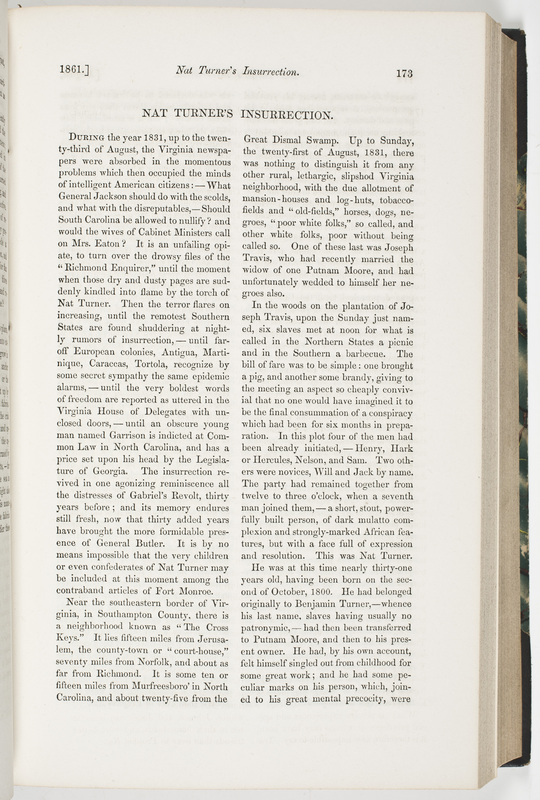"Nat Turner's Insurrection" from Atlantic Monthly
 In early 1861, while in command of Fort Monroe in Virginia, General Benjamin Butler declared fugitive slaves who made it across Union lines to be contraband and refused to return them to their Southern owners. His actions, and the thirtieth anniversary of Nat Turner’s rebellion, sparked an article in Atlantic Monthly looking back on Turner and his failed uprising. To the anonymous author of this piece, Turner’s rebellion was an incendiary moment in history: “It is an unfailing opiate, to turn over the drowsy files of the ‘Richmond Enquirer,’ until the moment when those dry and dusty pages are suddenly kindled into flame by the torch of Nat Turner.”
In early 1861, while in command of Fort Monroe in Virginia, General Benjamin Butler declared fugitive slaves who made it across Union lines to be contraband and refused to return them to their Southern owners. His actions, and the thirtieth anniversary of Nat Turner’s rebellion, sparked an article in Atlantic Monthly looking back on Turner and his failed uprising. To the anonymous author of this piece, Turner’s rebellion was an incendiary moment in history: “It is an unfailing opiate, to turn over the drowsy files of the ‘Richmond Enquirer,’ until the moment when those dry and dusty pages are suddenly kindled into flame by the torch of Nat Turner.”
The article traces Turner’s life in an attempt to create as complete a portrait as possible of a man history knows little about. Described as “a short, stout, powerfully built person, of dark mulatto complexion and strongly-marked African features,” Turner is portrayed as an intelligent, abstemious, morally upright young man. Turner’s strong faith and religious fervor began at a young age and his visions are described in great detail, culminating with a description of the signs that told him the time was ready for insurrection.
Turner is also described as upright, and the article even claims that white witnesses testified that they’d never heard Turner swear, nor saw him drink or steal. This rectitude later made Turner a great leader because he ensured that no rape, torture, or mutilation of the dead occurred during the insurrection. The author contrasts these rules of decency with the treatment of blacks at the hands of whites in the aftermath of the rebellion. This type of comparison is carried on throughout the article: contrasting Turner’s behavior with that of slaveholding whites, while also describing how slavery thwarted his potential. Turner and his followers were victims of the repressive slave system, which forced them to the only actions that could gain them their freedom. The general tone of the article is one of admiration for Turner’s capabilities and intelligence, while recognizing that because he was a slave, history records little about him. “Who now shall go back thirty years and read the heart of this extraordinary man …?”
The full text of this article is available through Google Books.
“Nat Turner’s Insurrection,” Atlantic Monthly. From the collection of the American Antiquarian Society.